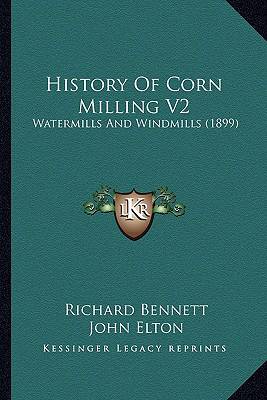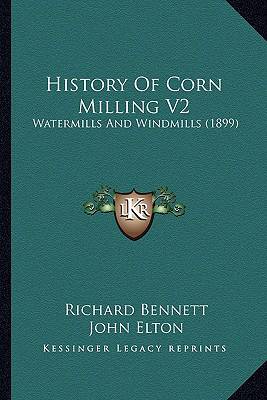
- Afhalen na 1 uur in een winkel met voorraad
- Gratis thuislevering in België vanaf € 30
- Ruim aanbod met 7 miljoen producten
- Afhalen na 1 uur in een winkel met voorraad
- Gratis thuislevering in België vanaf € 30
- Ruim aanbod met 7 miljoen producten
Zoeken
History Of Corn Milling V2
Watermills And Windmills (1899)
Richard Bennett, John Elton
Paperback | Engels
€ 46,45
+ 92 punten
Omschrijving
The History of Corn Milling Volume 2: Watermills and Windmills is a book written by Richard Bennett and originally published in 1899. This comprehensive work provides an in-depth look at the history of milling corn, from the earliest water-powered mills to the more modern windmills. The book is divided into two volumes, with the second volume focusing specifically on the development and use of watermills and windmills.The author delves into the technical aspects of milling, discussing the various types of mills, the machinery involved, and the different methods used to grind corn. He also explores the social and economic impact of milling, including the role of mills in rural communities, the impact of technological advancements on the industry, and the changing demands of consumers.Throughout the book, Bennett draws on a wealth of historical sources, including ancient texts, medieval manuscripts, and contemporary accounts. He also includes numerous illustrations and diagrams to help readers better understand the complex machinery involved in milling.Overall, the History of Corn Milling Volume 2: Watermills and Windmills is a valuable resource for anyone interested in the history of milling or the development of technology. It provides a detailed and fascinating account of the evolution of the milling industry, offering insights into the challenges and triumphs of those who worked in this important field.This scarce antiquarian book is a facsimile reprint of the old original and may contain some imperfections such as library marks and notations. Because we believe this work is culturally important, we have made it available as part of our commitment for protecting, preserving, and promoting the world's literature in affordable, high quality, modern editions, that are true to their original work.
Specificaties
Betrokkenen
- Auteur(s):
- Uitgeverij:
Inhoud
- Aantal bladzijden:
- 360
- Taal:
- Engels
Eigenschappen
- Productcode (EAN):
- 9781164672142
- Verschijningsdatum:
- 10/09/2010
- Uitvoering:
- Paperback
- Formaat:
- Trade paperback (VS)
- Afmetingen:
- 152 mm x 229 mm
- Gewicht:
- 480 g

Alleen bij Standaard Boekhandel
+ 92 punten op je klantenkaart van Standaard Boekhandel
Beoordelingen
We publiceren alleen reviews die voldoen aan de voorwaarden voor reviews. Bekijk onze voorwaarden voor reviews.











